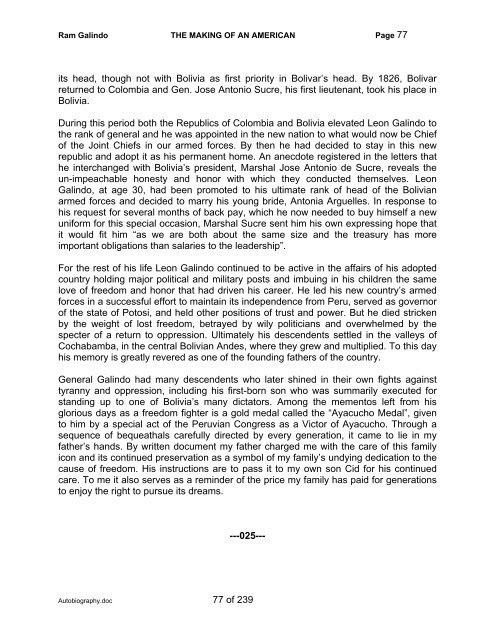Autobiography - The Galindo Group
Autobiography - The Galindo Group
Autobiography - The Galindo Group
Create successful ePaper yourself
Turn your PDF publications into a flip-book with our unique Google optimized e-Paper software.
Ram <strong>Galindo</strong> THE MAKING OF AN AMERICAN Page 77<br />
its head, though not with Bolivia as first priority in Bolivar’s head. By 1826, Bolivar<br />
returned to Colombia and Gen. Jose Antonio Sucre, his first lieutenant, took his place in<br />
Bolivia.<br />
During this period both the Republics of Colombia and Bolivia elevated Leon <strong>Galindo</strong> to<br />
the rank of general and he was appointed in the new nation to what would now be Chief<br />
of the Joint Chiefs in our armed forces. By then he had decided to stay in this new<br />
republic and adopt it as his permanent home. An anecdote registered in the letters that<br />
he interchanged with Bolivia’s president, Marshal Jose Antonio de Sucre, reveals the<br />
un-impeachable honesty and honor with which they conducted themselves. Leon<br />
<strong>Galindo</strong>, at age 30, had been promoted to his ultimate rank of head of the Bolivian<br />
armed forces and decided to marry his young bride, Antonia Arguelles. In response to<br />
his request for several months of back pay, which he now needed to buy himself a new<br />
uniform for this special occasion, Marshal Sucre sent him his own expressing hope that<br />
it would fit him “as we are both about the same size and the treasury has more<br />
important obligations than salaries to the leadership”.<br />
For the rest of his life Leon <strong>Galindo</strong> continued to be active in the affairs of his adopted<br />
country holding major political and military posts and imbuing in his children the same<br />
love of freedom and honor that had driven his career. He led his new country’s armed<br />
forces in a successful effort to maintain its independence from Peru, served as governor<br />
of the state of Potosi, and held other positions of trust and power. But he died stricken<br />
by the weight of lost freedom, betrayed by wily politicians and overwhelmed by the<br />
specter of a return to oppression. Ultimately his descendents settled in the valleys of<br />
Cochabamba, in the central Bolivian Andes, where they grew and multiplied. To this day<br />
his memory is greatly revered as one of the founding fathers of the country.<br />
General <strong>Galindo</strong> had many descendents who later shined in their own fights against<br />
tyranny and oppression, including his first-born son who was summarily executed for<br />
standing up to one of Bolivia’s many dictators. Among the mementos left from his<br />
glorious days as a freedom fighter is a gold medal called the “Ayacucho Medal”, given<br />
to him by a special act of the Peruvian Congress as a Victor of Ayacucho. Through a<br />
sequence of bequeathals carefully directed by every generation, it came to lie in my<br />
father’s hands. By written document my father charged me with the care of this family<br />
icon and its continued preservation as a symbol of my family’s undying dedication to the<br />
cause of freedom. His instructions are to pass it to my own son Cid for his continued<br />
care. To me it also serves as a reminder of the price my family has paid for generations<br />
to enjoy the right to pursue its dreams.<br />
---025---<br />
<strong>Autobiography</strong>.doc 77 of 239


